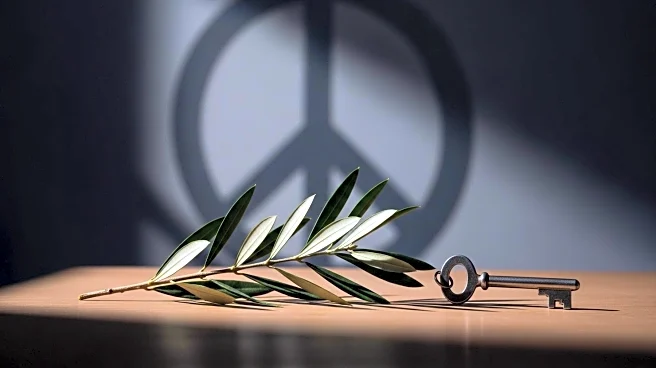What is the story about?
What's Happening?
Israel has decided not to release Marwan Barghouti, a prominent Palestinian leader, as part of a prisoner exchange deal with Hamas under the new Gaza ceasefire agreement. Barghouti, who is serving multiple life sentences for his involvement in attacks that killed five people, is seen by Israel as a terrorist leader. However, he is considered by many Palestinians as a unifying figure and a potential successor to President Mahmoud Abbas. The ceasefire agreement involves Hamas releasing about 20 Israeli hostages, while Israel will free approximately 250 Palestinian prisoners, along with around 1,700 individuals detained from Gaza over the past two years. Despite Hamas's insistence on Barghouti's release, Israel has maintained its stance, fearing his potential influence as a rallying figure for Palestinians.
Why It's Important?
The decision not to release Marwan Barghouti highlights the complexities of Israeli-Palestinian relations and the ongoing struggle for leadership within Palestinian territories. Barghouti's potential release could have significant implications for Palestinian politics, possibly strengthening Palestinian institutions and altering the balance of power. His popularity and advocacy for a two-state solution make him a formidable figure, capable of bridging divisions among Palestinians and engaging with Israelis. Israel's refusal to release him reflects concerns over his influence and the potential for a unified Palestinian leadership, which could challenge Israel's policies and approach to the conflict.
What's Next?
The prisoner exchange deal is set to proceed with the release of other Palestinian prisoners, but the exclusion of Barghouti may lead to further negotiations and discussions. Hamas and other Palestinian factions may continue to push for his release, potentially using diplomatic channels and international pressure. The situation remains fluid, with the possibility of future agreements or changes in the political landscape. The ceasefire itself may lead to temporary stability, but underlying tensions and unresolved issues could resurface, affecting the broader peace process.
Beyond the Headlines
The refusal to release Barghouti underscores the broader geopolitical dynamics and the role of influential figures in shaping the future of the Israeli-Palestinian conflict. His imprisonment and the ongoing debate over his release highlight the challenges of achieving lasting peace and the importance of leadership in navigating complex political landscapes. The situation also raises questions about the ethical and legal dimensions of prisoner exchanges and the impact of such decisions on human rights and international relations.















